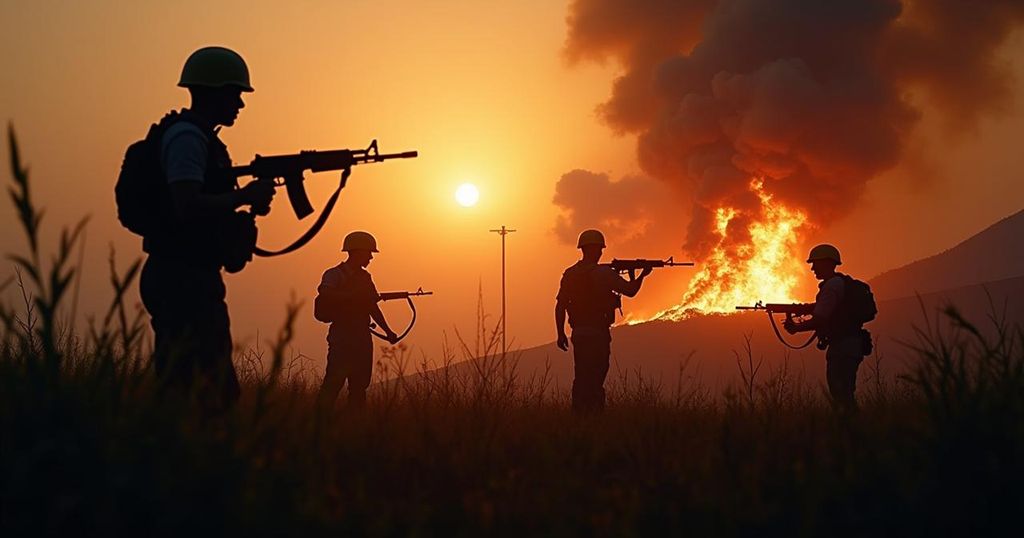Tragedy at the Guatemalan Border: Six Migrants Killed by Mexican Army Fire
Six migrants were shot dead by Mexican soldiers near the Guatemalan border, prompting international calls for investigation and accountability. This incident, which has drawn severe condemnation, highlights the ongoing crisis around migrant safety in Mexico and the contentious role of military forces in immigration enforcement.
Recent tragic events unfolded near the Guatemalan border when Mexican army personnel opened fire on a truck transporting migrants from multiple countries, resulting in the deaths of six individuals from Egypt, Peru, and El Salvador. This incident, which occurred on the very first day of President Claudia Sheinbaum’s administration, has drawn significant condemnation and calls for accountability from various quarters. During the incident, a total of ten other migrants sustained injuries due to the gunfire. While the precise details regarding the nationalities and identities of those killed are still emerging, Peru’s Foreign Ministry has confirmed that one of its citizens was among the deceased and has demanded an immediate and thorough investigation into the circumstances surrounding the shooting. This tragic loss has once again highlighted the fraught relations between Peru and Mexico, particularly following a diplomatic incident in 2022. In her public statements, President Sheinbaum assured that the two soldiers responsible for the shooting have been handed over to civilian prosecutors for inquiry, although they have not yet faced criminal charges. She emphasized that investigations will be conducted to ascertain any potential accountability for commanding officers. However, this incident marks the most severe loss of life among migrants at the hands of authorities in Mexico since a similar occurrence in 2021, where a total of 17 individuals lost their lives in Tamaulipas. The detainment occurred in Huixtla, a location in Chiapas commonly associated with migrant smuggling activities. The regional defense department has provided a somewhat ambiguous report, asserting that soldiers perceived gunfire as a convoy approached their position, prompting them to open fire. Following the shooting, responders discovered four deceased migrants and later reported that two others had succumbed to their injuries. The Defense Department has not conclusively stated if the migrants died due to the army’s gunfire, nor has it clarified the nature of any weapons found within the migrants’ vehicle. Among the total of 33 individuals in the truck, 17 escaped unharmed, indicative of the high-risk conditions facing migrants traversing this perilous route, often at the mercy of corrupt practices and the influence of narcotics trafficking groups. This incident has reignited discussions surrounding Mexico’s militarization of immigration policy, with critics decrying it as a severe infringement upon human rights. Activists and organizations, including the Roman Catholic Mexican Council of Bishops, have publicly criticized the shooting as indicative of systemic issues concerning the military’s role in immigration enforcement, characterizing the response as a disproportionate application of lethal force. Should it be confirmed that these deaths resulted from army action, it would pose a considerable embarrassment for President Sheinbaum, especially since her administration is following a precedent that provides significant latitude to military forces regarding law enforcement activities. This distressing incident serves as a grim reminder of the ongoing complexities faced by migrants in Mexico and the pressing need for comprehensive reforms to protect their rights and lives.
This incident adds to a troubling narrative regarding the treatment of migrants in Mexico, particularly as they navigate perilous routes often dominated by both organized crime and state authorities. Individuals from various nations, including Egypt, Peru, and El Salvador, frequently find themselves vulnerable to violence and irregularities in the enforcement of immigration regulations. The historical context of military involvement in immigration policy has raised significant concerns regarding human rights practices, leading to heightened scrutiny of governmental responses to migrant safety and security. Furthermore, the diplomatic friction between Peru and Mexico underscores the broader implications of international relationships in this context, particularly as nations grapple with the impacts of migration and border enforcement.
The tragic shooting of migrants by Mexican army personnel near the Guatemalan border underscores the urgent need for critical examination of military involvement in immigration policy and the systemic issues that lead to such violent outcomes. Advocates are calling for thorough inquiries and accountability to prevent further occurrences. As the situation evolves, it remains imperative for both domestic and international stakeholders to address the fundamental human rights concerns surrounding migration and ensure the protection and dignified treatment of all individuals seeking safety and opportunity.
Original Source: abcnews.go.com




Post Comment